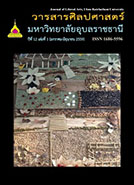การให้ความหมาย ที่มาของความหมายและองค์ประกอบ ความสุขในการทำงานของกลุ่มอาจารย์มหาวิทยาลัยใน เจนเนอเรชั่นวาย: การวิจัยเพื่อสร้างทฤษฎีฐานราก
Main Article Content
บทคัดย่อ
การวิจัยครั้งนี้เป็นการวิจัยเชิงคุณภาพเพื่อสร้างทฤษฎีฐานราก มี วัตถุประสงค์ คือ 1) เพื่อค้นหาความหมายและที่มาของความหมายของความสุข ในการทำงานของกลุ่มอาจารย์มหาวิทยาลัยในเจนเนอเรชั่นวายและ 2) เพื่อสร้าง ทฤษฎีฐานรากเกี่ยวกับองค์ประกอบความสุขในการทำงานของกลุ่มอาจารย์ มหาวิทยาลัยในเจนเนอเรชั่นวาย คัดเลือกกลุ่มตัวอย่างแบบเฉพาะเจาะจง จำนวน 12 ราย โดยเก็บข้อมูลด้วยการสัมภาษณ์เชิงลึก การสังเกต การจดบันทึก และศึกษาจากเอกสาร เก็บรวบรวมข้อมูลช่วงเดือนกุมภาพันธ์ พ.ศ. 2559 ผลการวิจัยพบว่า ความหมายและที่มาของความหมายของความสุขในการทำงาน ได้แก่ 1) การได้ทำงานที่ตนเองรัก 2) การมีทีมงานที่ดี 3) บรรลุผลสำเร็จตาม เป้าหมายที่ตั้งไว้ 4) มีความสมดุลในชีวิตและการทำงาน 5) ได้พัฒนาตนเอง และ 6) มีความมั่นคงในชีวิต ส่วนองค์ประกอบความสุขในการทำงาน แบ่งได้ 2 ปัจจัยคือ ปัจจัยภายใน ได้แก่ ตนเอง และปัจจัยภายนอก ประกอบด้วย 1) ผู้บริหาร/ หัวหน้างาน 2) องค์กร 3) เพื่อนร่วมงาน และ 4) ลูกศิษย์ ตามลำดับ ในตอนท้าย ของบทความได้นำเสนอข้อเสนอเชิงทฤษฎีและข้อเสนอในการปฏิบัติที่ได้จากผลการวิจัย
This is a qualitative research in order to create the grounded theory. The research was aimed 1) to find the social construction meaning and source of meaning of work happiness of university lecturers in generation Y, and 2) to theorize a grounded theory of work happiness component of the university lecturer in generation Y. The researchers used purposive sampling at 12 university lecturers in generation Y. The data was collected by indepth interview, observation, note taking, and documentary study in February 2016. The result showed that the social construction meaning and the source of meaning of work happiness were following; 1) work that they love, 2) good environment, 3) goal achievement, 4) work life balance, 5) self-development and 6) security life. In the work happiness component was divided 2 factors namely; the internal factor was the self, and the external factors were 1) management team and supervisor, 2) organization, 3) colleague, and 4) student, respectively. At the end of article, the researcher also proposed both theoretical and practical suggestions from the study.


